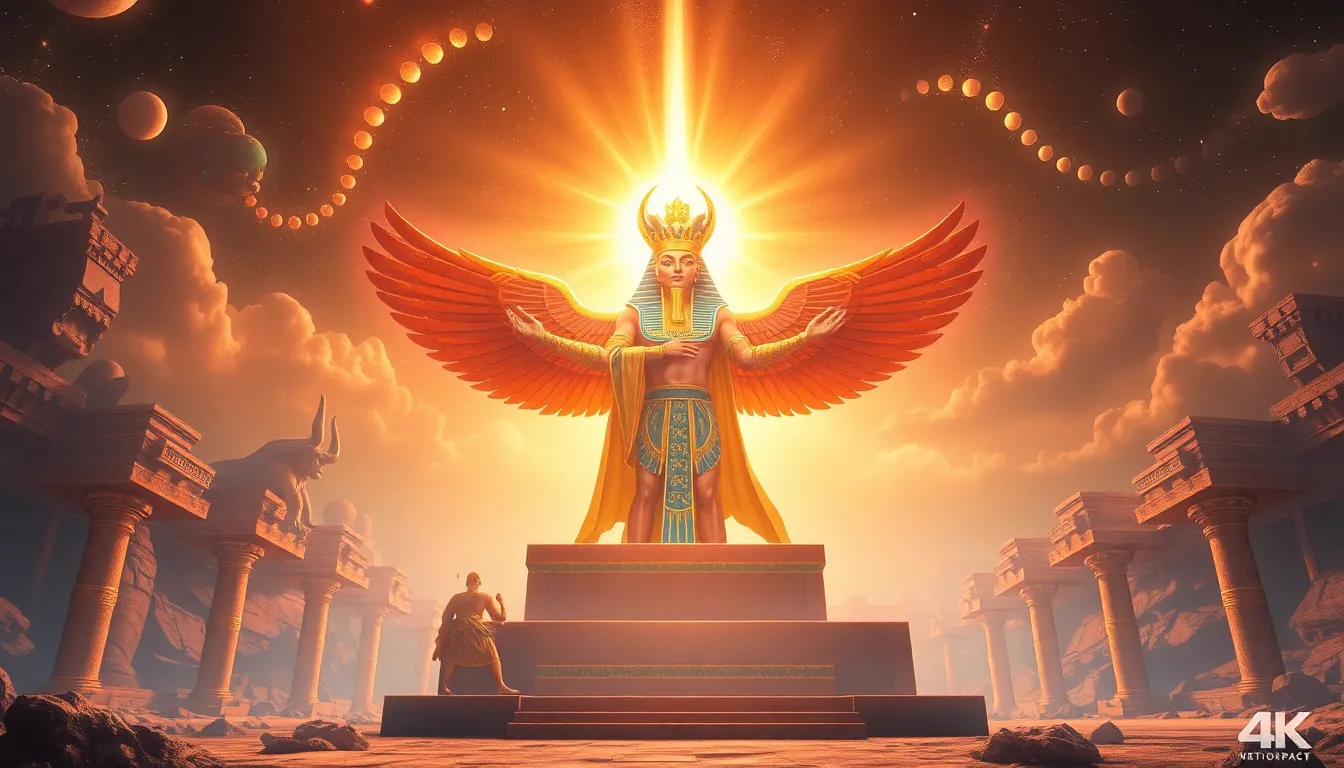The Pharaoh’s Divine Role in the Afterlife Journey
I. Introduction
Ancient Egyptian civilization is renowned for its rich tapestry of beliefs surrounding the afterlife. Central to these beliefs is the understanding that life did not end with death; rather, it transformed into a journey that required guidance, protection, and preparation. The Pharaoh, as the divine ruler of Egypt, held a crucial position in this context, serving as a bridge between the mortal realm and the divine.
This article explores the multifaceted role of the Pharaoh in the afterlife journey, highlighting the significance of the Pharaoh’s actions, responsibilities, and beliefs in shaping the spiritual landscape of ancient Egypt.
II. The Concept of Ma’at
At the heart of ancient Egyptian belief systems lies the concept of Ma’at, representing truth, balance, and cosmic order. Ma’at was not merely an abstract idea; it was a fundamental principle that governed the universe and human affairs.
- Definition and significance of Ma’at: Ma’at embodied the notion of harmony and justice, ensuring that chaos did not prevail in the world.
- The Pharaoh’s responsibility to uphold Ma’at: The Pharaoh was seen as the earthly embodiment of Ma’at, tasked with maintaining order and stability in society.
- Ma’at’s role in the afterlife judgment: The concept of Ma’at played a pivotal role in the judgment of souls in the afterlife, where one’s adherence to Ma’at determined their fate.
III. The Pharaoh as a Mediator
The Pharaoh occupied a unique position in ancient Egyptian society, acting as a mediator between the gods and the people. This role was essential, particularly in the context of afterlife beliefs.
- The Pharaoh’s position between gods and mortals: The Pharaoh was believed to be a living god, ensuring divine favor and intercession on behalf of the people.
- Rituals and ceremonies: Various rituals were performed by the Pharaoh to honor the deceased, ensuring that their journey into the afterlife was auspicious.
- The Pharaoh’s divine authority: As the ultimate authority, the Pharaoh guided souls through their afterlife journey, offering protection and support.
IV. Funerary Practices and Beliefs
Funerary practices were of paramount importance in ancient Egypt, particularly for the Pharaohs, whose legacies were intricately tied to their afterlife preparations.
- The significance of burial rituals: Elaborate burial rituals were conducted to ensure the Pharaoh’s safe passage into the afterlife.
- The construction of pyramids and tombs: Pyramids and lavish tombs served as vessels for the Pharaoh’s afterlife, showcasing their power and divine status.
- Offerings and prayers: Offerings of food, goods, and prayers were made to sustain the Pharaoh in the afterlife, reflecting the belief in continued existence.
V. The Journey through the Duat
The Duat, or underworld, was a complex realm that every soul had to navigate after death. The Pharaoh’s journey through the Duat was marked by trials and tribulations.
- Overview of the Duat: The Duat was depicted as a dark, labyrinthine place filled with challenges and dangers.
- The Pharaoh’s journey through the Duat: The Pharaoh faced numerous obstacles, including hostile forces and judgment by deities.
- The role of deities: Various gods, such as Anubis and Osiris, played critical roles in assisting the Pharaoh during this perilous journey.
VI. The Weighing of the Heart Ceremony
One of the most significant rituals in the afterlife journey was the Weighing of the Heart ceremony, which determined the fate of the deceased.
- Description of the ceremony: In this ceremony, the heart of the deceased was weighed against the feather of Ma’at.
- The Pharaoh’s heart against the feather: A balanced scale indicated a life lived in accordance with Ma’at, leading to a favorable judgment.
- Implications of the outcome: A heavy heart, burdened by sin, would lead to annihilation, while a light heart ensured eternal life.
VII. The Legacy of the Pharaoh’s Afterlife Beliefs
The beliefs surrounding the Pharaoh’s afterlife journey have left an indelible mark on the cultural and historical landscape of Egypt.
- Influence on subsequent rulers: The afterlife beliefs established by the Pharaohs influenced the practices of later dynasties.
- Transition of beliefs in modern culture: Aspects of these ancient beliefs persist in modern Egyptian culture and spirituality.
- Archaeological findings: Excavations of tombs and pyramids have revealed much about the Pharaohs’ beliefs and practices regarding the afterlife.
VIII. Conclusion
In summary, the Pharaoh’s divine role in the afterlife journey underscores the intricate beliefs held by ancient Egyptians regarding mortality and the afterlife. The Pharaoh, as a mediator, protector, and embodiment of Ma’at, was central to ensuring the continuation of life beyond death. These beliefs not only shaped the lives of the Pharaohs themselves but also influenced the entire civilization, leaving a lasting legacy that continues to captivate our understanding of ancient Egyptian mythology.
Reflecting on these beliefs allows us to appreciate the complexity of ancient Egyptian civilization and its enduring impact on human culture and spirituality. The Pharaoh’s role in the afterlife mythology serves as a testament to the eternal quest for meaning and understanding in the face of mortality.




